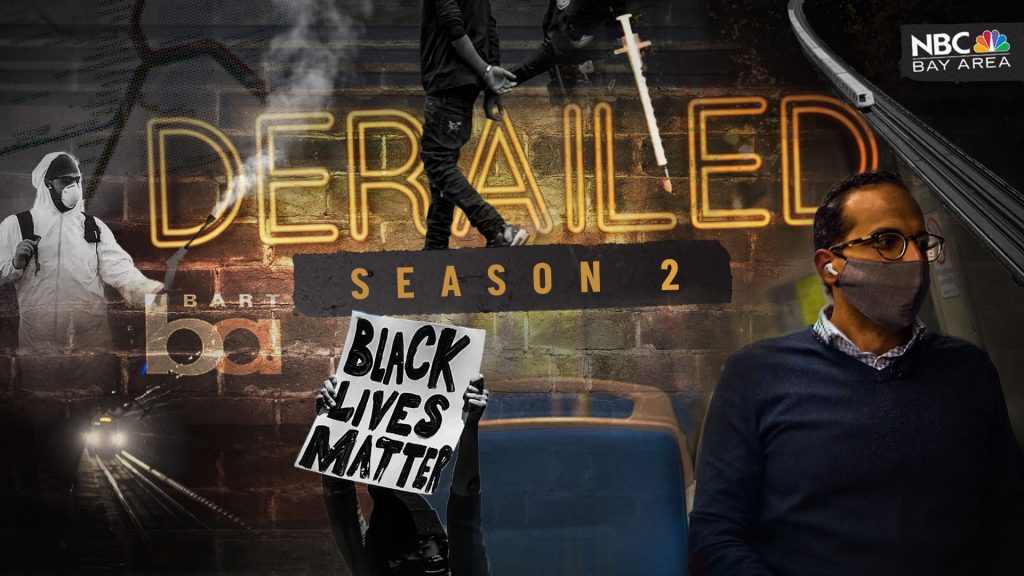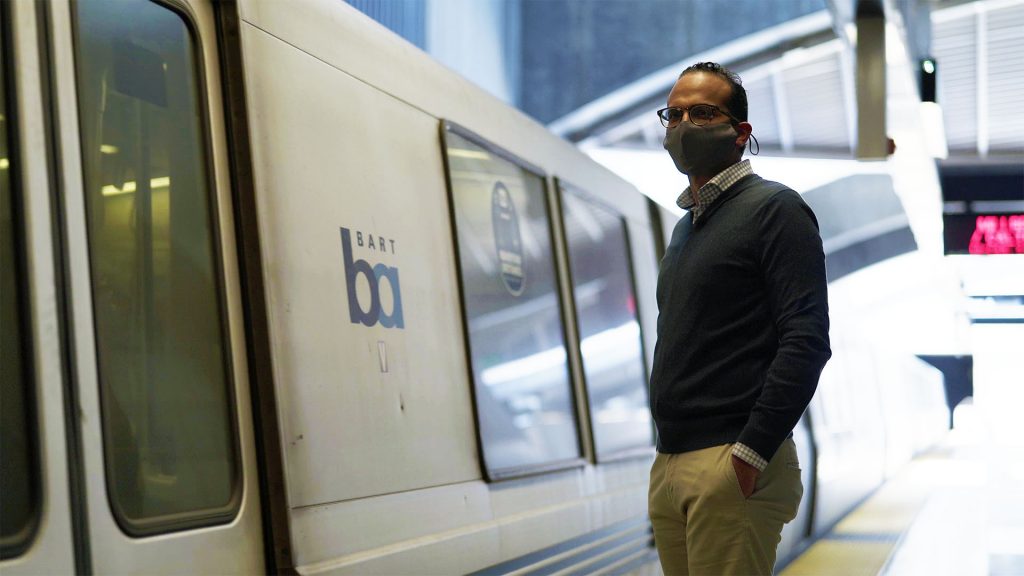
Some people flock to streaming platforms for juicy dramas. Others queue up quirky comedies. But there’s also an audience willing to binge-watch local journalism. Just ask NBC Bay Area.
Last week, the NBC-owned station dropped its second season of Derailed, an in-depth digital series investigating problems at BART, the Bay Area’s beleaguered public transit system. The whole project lives on NBCBayArea.com, YouTube, and Apple TV, ready to stream in six digestible episodes ranging from about 4 to 15 minutes long.
“We call it giving viewers the Netflix experience,” says news director Stephanie Adrouny. “People are used to being able to see something when they want to see it. They don’t want to be teased. They want to know that ‘I can go see it right now, when I want to, for as many chapters as I want to see.’”
That strategy has had clear success for the streaming giants, but it was a bit of gamble for an investigative news team — even one that prides itself on using digital platforms to reach a market known for low TV viewership.
“While we drop a lot of digital-original content, we’d never done a big series like this on digital-first,” says Adrouny. “Typically, we’d put it on TV, and it goes from there. But we wanted to get away from that. If you’re a BART rider, we thought, ‘Hey, maybe you’ll watch Chapter One on your way to work and Chapter Two on your way home.’”

To date, about 350,000 people have streamed the first season of Derailed on its various platforms, and many of them have engaged with the project on social media. Senior investigative reporter Bigad Shaban says viewers have written in with their own BART stories, sent in videos they’ve captured while commuting, and even offered news tips for further reporting.
“I’ve never received more feedback on anything I’ve worked on,” says Shaban. “There’s this sort of farce that people don’t want investigative journalism — that they want it fast-paced, everything quick and fluffy. And I don’t buy that. I just think the way people are consuming it is different, and that’s something to be aware of and adapt to.”
“You may not have people who are willing to sit down at a regularly scheduled newscast,” he says. “So it’s our responsibility and — if we want to survive — our necessity, our mandate, to give it to them in a different way.”
Pick a digital-first project to seek new audiences
In picking Derailed’s platforms, Adrouny partnered with Sara Bueno, NBC Bay Area’s head of digital. Adrouny says they decided to go for a streaming series over a traditional TV project in an effort to connect with more viewers.
“It’s about reaching more audiences or new audiences who maybe don’t watch television or at least don’t watch appointment television,” she says. “We wanted to offer a project that was meaningful and that people could watch on their own time at their own pace.”
Bueno says the format made sense as the Bay Area is “a lead market in terms of cord-cutting.”
“Think about how people consume content,” she says. “A lot of it is mobile. It’s on a tiny screen. Maybe it’s an iPad. It could even be YouTube on a big screen in the house. We know they’re going to other devices and platforms, so this is the market to do this kind of experimentation.”
Right now, NBC Bay Area monetizes Derailed with the typical array of digital ad inventory, but the digital focus doesn’t rule out a TV version. Season One was repackaged as an hour-long special for broadcast after the streaming series went live. (The station may do the same for Season Two, though there are no firm plans yet.)

Find freedom for storytelling in an innovative format
In a digital series, Adrouny says the news team was free to experiment in ways that added context and nuance to the reporting.
“We broke that fourth wall,” she says. “Bigad will stop an interview and go, ‘Wait a minute, let me explain what he’s talking about.’ Being open and transparent about the reporting process — we got a lot of good feedback about that.”
It also allowed for fuller exchanges between Shaban and his interviewees.
“I think showing the question is often so powerful, and it can really change the context of the answer,” he says. “The limitations [of a standard newscast] often prevent you from having that back-and-forth, but I feel like any great debate is founded on that back-and-forth. It almost seems counterintuitive [if] you’re not utilizing the conversation.”
Watch the introduction to Derailed Season Two. (NBC Bay Area)
Choose a subject that’s relevant in its own right — and connects to other community issues
Before the coronavirus pandemic, Shaban says you’d have been hard-pressed to find someone in the Bay Area who didn’t commute on BART: “It’s something that people rely on and are sort of forced to rely on. It’s one of those things that even if it’s not working or they don’t like it or they don’t feel safe, people are still using it.”
That meant the topic was ripe for investigation. And after the virus hit — and was followed by a national reckoning on race — the news team discovered even more to explore. As a result, Season Two digs into the transit system’s safety data, policing practices, and financial situation.
“What’s interesting about BART is it’s this microcosm of what is happening in our communities — locally and across the nation,” says Shaban. “It’s police reform. It’s racial equity. It’s COVID-19. It became this really interesting backdrop to tell all these really important stories.”
With the series digital up and running, Bueno says the newsroom is well-prepared for continuing BART coverage.
“With Derailed, calling it a ‘season’ was great,” she says. “As the story goes through updates and changes, we can deliver a new season or a bonus chapter. The idea is that the story is fluid.”
Tap other digital assets to promote an online series
The innovation didn’t stop when the investigation went live. Adrouny says the team also experimented with promotion.
“We didn’t promote it in advance,” she says. “When it was there and available, that’s when we told people about it, and we got good feedback: ‘Thanks for not making me wait till next week or Sunday night or whatever.’ We learned that format worked.”
To spread the word, Adrouny called on digital correspondent Abbey Fernandez, whose social media skills we profiled last year.
“She did a piece on her ‘Synced In’ show on Instagram and ‘Hey Abbey’ on YouTube. She did a behind-the-scenes [on the investigation]: ‘How did you find out this? Why did you go in that direction?’ It was about bringing all of our digital projects together,” says Adrouny. “Abbey speaks to a whole different audience than maybe Bigad does. So we wanted her to get the message out, too.”
With Derailed Season Two now wrapped, NBC Bay Area is looking ahead to another batch of digital-first investigations. “I probably can’t say too much, but Stephanie and I are working on multiple projects,” says Bueno. “All in this sort of vein — several chapters, series format.”
“We want people to see the journalism,” says Adrouny. “In the end, that’s it. Because we care about doing good work and reporting on our community. So take a chance. We did, and we feel like it worked.”
Get the Lab Report: The most important stories delivered to your inbox